Baculoviruses, which belong to the family Baculoviridae, are a group of DNA viruses that infect insects. These viruses are very small, rod-shaped structures, composing of a protein coat containing a small amount of DNA which encodes components for further viral reproduction.
 Colorhype | Shutterstock
Colorhype | Shutterstock
The term baculovirus comes from the latin baculum, meaning cane or walking stick, denoting the distinct shape of these viruses.
Common hosts for baculoviruses
Baculoviruses infect a large range of insects mainly deriving from the orders Diptera (flies), Hymenoptera (wasps, bees and ants) and Lepidoptera (butterflies and moths). The most commonly studied baculoviruses infect the larval stage of the Lepidoptera order, i.e. caterpillars.
These viruses play a vital role in certain natural ecosystems. The gypsy moth, found in North America, is heavily regulated by baculoviruses. Potentially up to 50% of their population mortality is caused by specific baculoviruses.
They have been shown to have no negative effect on mammals, birds, fish, or any non-target organism, including humans.
How do baculoviruses replicate?
Baculoviruses use unique mechanisms to survive and proliferate in their environment. When baculoviruses are outside a host, waiting to be ingested, they survive within occlusion bodies. These are bodies of protein which envelop and protect the virions (the form of the virus when external to a host cell) until they are ingested by a host.
The occlusion bodies are stable in the environment, but when they are ingested by an insect, the high pH of the insect gut causes the breakdown of the protein and the release of the virions.
The virions enter cells and self-replicate, hijacking the machinery of the host cell to produce DNA and protein, forming more viruses. After replication has occurred, the final step is the production of a protein called polyhedrin. This protein crystallises in the cell and surrounds the virions, forming an occlusion body ready for dispersal.
The virions produced by an occlusion body are called occlusion-derived virions (ODV). Another type of virion that the baculoviruses produce are called budding virions (BV) which are responsible for the cell to cell, systemic infection within insects.
Biopesticides
These viruses have a vast market in the agricultural industry. Their specificity allows them to be selected and designed to infect and reduce levels of any chosen insect pest.
Viruses are obligate parasites, meaning that they cannot reproduce without a host. This is advantageous for the use of baculoviruses as natural pesticides, as their levels will decrease once they have effectively reduced the target insect’s population.
The high specificity of baculoviruses can be a disadvantage, though, because agriculturists often want to protect against a variety of insect pests with a single investment. A selection of different baculovirus biopesticides may therefore be needed.
How does this compare to other insecticide methods?
Baculoviruses are comparatively slow in reducing the insect pest population compared to alternative insecticides like chemical treatment. They are therefore mainly used only for high value crops or when crops have become resistant to chemical insecticides.
Chemical pesticides are also cheaper compared to baculovirus biopesticides, but at the cost of many more potential negative effects. These can include damage to non-target organisms which can affect the local ecosystem, and the development of resistance.
Baculoviruses can potentially also be genetically modified to increase the performance and speed of their action as biopesticides. This strategy is likely to be developed in the future.
Viral vectors
Baculoviruses can also be used as gene delivery vectors, where certain genes of interest can be cloned into cells during gene therapy. These viruses are useful in this area as they have few cytotoxic effects in human cells, and do not replicate within them.
Another advantage of baculoviruses as viral vectors, over many other forms of gene therapy, is the absence of vulnerability to the human immune system, as it does not recognize baculoviruses.
Baculoviruses are therefore a very useful tool in modern biotechnology, as well as in agriculture, and their development in the future might open up even more options for their applications.
Further Reading
Last Updated: Jun 28, 2019